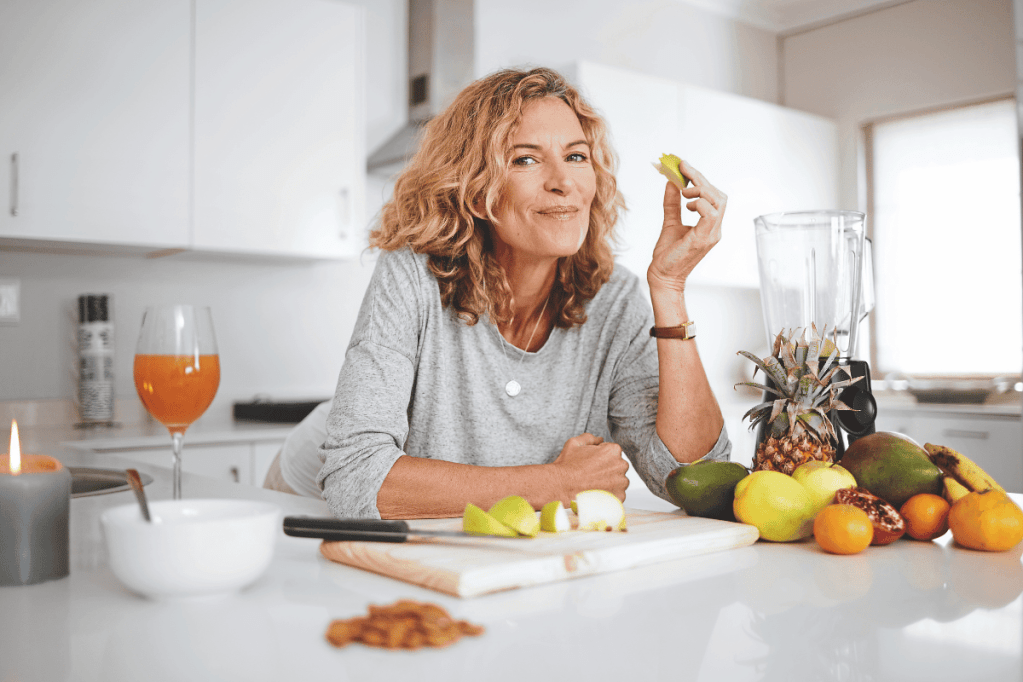Try these 6 ways to boost your hormone health

Feeling a little off kilter? It’s time to turn detective and find out what’s really going on with our bodies and our hormone health, Sally Saunders discovers.
Words: Sally Saunders. Images: Shutterstock, Pexels
I’ve always considered myself to be quite in tune with my hormones. I’ve been adept at spotting the minor fluctuations that arise at different times of the month, and, after a few tumultuous teenage years, I became increasingly aware of the way they can shape my mood and outlook. But as I head firmly into perimenopause territory, I feel on shaky ground.
The gentle(ish) waves that would come and go each month are becoming more stormy, and I’m worried about getting swept away. So I turn to hormone health specialist Hannah Alderson, author of Everything I Know About Hormones (DK Red, £16.99), to find out more.
‘It’s kind of like an intricate dance,’ she says. ‘It’s a super dynamic system, the endocrine [hormone]system, and nothing works in isolation, and that’s really important to remember. If there’s an imbalance, it’s like a domino effect where everything can come crashing down.’ And that’s especially the case when it comes to sex hormones, like oestrogen and progesterone.
‘They can have a direct and indirect impact on your mood,’ explains Alderson. ‘So if your oestrogen is not functioning optimally, that can impact your ability to make serotonin, your feel-good, happy hormone. They’re all interconnected, and where there is an imbalance, it can manifest with mood disorders and feeling low or anxious, depressed.’
How can I tell if my hormone health is unbalanced? There are a raft of tests we can have to identify how well our hormonal system is working, but for most of us before we call in the big guns, the first thing to do is turn detective ourself, says Alderson.
‘Look at what clues your body is giving you,’ she says. ‘Are you feeling low in energy? Are there different sort of differences in your cycle? Is it irregular? Are you noticing things like sweet cravings, energy crashes, problems with your hair (whether that’s hair loss or excess hair in places that you wouldn’t normally see it), or perhaps acne.
‘There’s a whole manifestation of how hormonal symptoms can present themselves, but the first thing that we should always do is just check in to see how you’re feeling, and if we’re noticing things like mood disorders, low energy and specifically, if things are linked with your cycle, that’s a very big clue.
Where there is an imbalance with hormonal health, there is a massive window of vulnerability for anxiety and depression and low mood.’ (If you’re struggling with mood swings during perimenopause or menopause, read our advice on how to cope here)
What’s causing it? So if you’re ticking off lots of those clues, like I am, what’s at the root of the issue, and what, if anything, can we do to take charge of the situation?

‘The main drivers of hormonal dysfunction come down to diet, stress, and the body clock,’ explains Alderson. ‘When it comes to diet you could have insulin resistance, diet-induced inflammation, nutritional deficiencies or an imbalance in the gut.’
She says that dietary-induced inflammation is usually a key contributing factor. ‘It’s sort of a low-grade, constant inflammation, and that’s driven very much by a lot of what the majority of people are eating day to day, too much alcohol, too much ultra-processed food,’ she says.
‘We can also have lots of endocrine disrupting ingredients, which can mimic and block hormones.’ She advises avoiding items with a long shelf life, and those with a long ingredients list full of items you don’t recognise. ‘We need to look out for all the emulsifiers and stabilisers and preservatives,’ she says. ’The other key issues to avoid are significant stress and too much disruption to your body clock.
‘In the summer, you might be travelling a bit more, hopping on an aeroplane, skipping between time zones, which could impact you. Or you might be having a few nibbly bits in the garden and hitting the rosé.’
I must admit I’m starting to worry — is this just a list of things to avoid? Alderson puts my mind at rest: she has a whole programme of steps to put in place to gently support our bodies to help us find balance, health and happiness.
Read on to discover her six pillars, and find out how to take some simple steps to feel better today…

1. Balance your blood sugar
‘The aim of the game is to try and prevent too many glucose spikes,’ says Alderson. ‘At every meal you want to eat less glucose, which is found in starchy carbohydrates, like breads, biscuits, pasta, and instead pick good sources of carbohydrate, focusing on things like beans, legumes, oats, quinoa, good quality bread, like rye bread, sourdough.
‘Try to minimise the ones that can give us a little bit of too much sugar all in one go, like pastas, cheap, squidgy white breads, biscuits, crisps, sweets. And then we want to pair our good carbohydrates with good quality sources of protein, fat, fibre.
‘At every meal ask the question “Where is the protein? Where is the good fat? Where is the fibre?”
‘The way I describe it is you want to multitask your digestive system with all of the macronutrients at the same time, because if you just have carbohydrate on its own, your body’s very efficient at breaking that down very quickly.
‘Let’s say we wake up, we have a piece of toast for breakfast, and then we could see a spike in our blood sugar. But if we go for good quality sourdough or rye, pair it with eggs and avocado, for protein and fat, it’s a much more balanced meal.’
2. Eat colourful
‘This is a simple one, just eat as many different coloured fruit and vegetables as you can, eat a rainbow,’ says Alderson. ‘The different colours represent different antioxidants and phytochemicals which are good for your whole system, plus the fibre looks after your gut.’
3. Eat smart
‘The liver is like the body’s laboratory, and it’s really important when it comes to hormonal health,’ says Alderson.
‘We want to help the liver to clear hormones optimally, and we can do this by eating lots of cruciferous vegetables, (like cauliflower, kale, broccoli, cabbage etc) making sure we’ve got lots of fibre in the diet, to make sure we’re having regular bowel movements. Things like flax seeds can be really great too, not drinking too much, and having lots of nice herbal teas.’

4. Move more for better hormone health
‘It’s really important we’re working on our muscle mass and improving that, by getting outside and moving more, but in the right way,’ says Alderson. ‘That means avoiding things like fasted workouts and doing too much intense activity too often, because that can actually be a bit stressful for the body.
‘Instead we want a lovely combination of building up your muscle mass restorative exercise, but also getting outside, and moving your body, bringing a sense of joy, because that’s going to make you feel your best.’
5. Sleep better
‘Your body clock is like the beat to your hormonal drum,’ says Alderson. ‘It’s really, really important we get our sleep-wake cycle in tune as much as possible. ‘This means going to bed at the same time, avoiding too much screen time. Instead spend time outside, getting the full spectrum of daylight on your face.
‘If you’ve got a very busy life, or you’ve got young kids, the best thing to do is focus on the quality over the quantity, because sometimes we can’t always get a good night’s sleep, that’s not always achievable. So instead we really work on nurturing your hormone called melatonin: that loves the dark, so we want a dark room, or an eye mask.
‘And make the most of the early sunrises, that’s a great way to feel your best: the first thing you do when you wake up, open your blinds and get the full daylight hitting your retina. It’s like your body is being reminded it’s the morning, which signals lots of different pathways for your hormones to function optimally.’

6. Live positive
Finally, it’s important to introduce some joyful, happy-making activities to balance the challenges you feel. ‘This is about dampening down elevated cortisol,’ says Alderson. ‘Cortisol is really amazing, but it’s like a fog horn. If there’s too much of it, it can definitely drive imbalances in the body, making you feel anxious, and driving things like weight gain, particularly around the middle.
‘So we want to fill up your cup with lots of different things throughout your day, which are going to remind your nervous system that you’re safe.’ Top of the list are breathwork and yoga, to calm the nervous system. ‘But at this time of year make the most of the sunnier weather, go for a walk after lunch, spend time with people you love.
‘These are all things that will boost oxytocin, which is your love and bonding hormone. Boost it further by skin-to-skin contact, hugging, doing random acts of kindness, and, filling up your calendar with things that are really lovely to do in the summer. Enjoy those beautiful things, be in the moment.
‘Spend time with people you love, do things that make you laugh and that are joyful, because it is not only going to boost your mood, but it’s also going to boost your body’s ability to make the hormones that make you feel in a good mood.
‘So if they’re coming together, of all of those things, you’ll hopefully soon discover that really simple changes can have a huge impact.’
Hannah Alderson is a BANT registered nutritionist and hormone health specialist, and author of Everything I Know About Hormones (DK Red, £16.99), out now.









